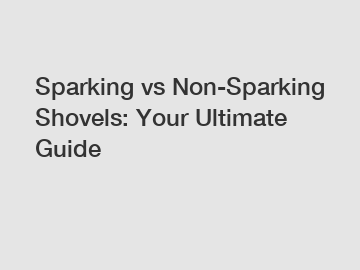Sparking vs Non-Sparking Shovels: Your Ultimate Guide
Sparking vs Non-Sparking Shovels: Your Ultimate Guide.
When it comes to selecting the right shovel for your work, one of the key considerations is whether to choose a sparking or non-sparking shovel. The answer depends on the nature of the materials you will be working with and the potential risks involved. In this comprehensive guide, we will explore the differences between sparking and non-sparking shovels, the reasons behind their design, and the significance and impact of using the appropriate tool.
The Difference between Sparking and Non-Sparking Shovels.

Sparking shovels, as the name suggests, are designed to produce sparks when they come into contact with certain materials. These shovels are typically made of steel, which can create sparks when struck against other metals or hard surfaces. In contrast, non-sparking shovels are made from materials that do not produce sparks, such as bronze, aluminum bronze, or copper beryllium alloys. This distinct characteristic makes non-sparking shovels suitable for tasks where the risk of fire or explosion is present, such as in environments with flammable gases or dust.
Reasons Behind the Design.
The design of sparking and non-sparking shovels is driven by the need to ensure safety in potentially hazardous work environments. Sparking shovels are commonly used in construction, mining, and other industrial settings where the presence of sparks is not a safety concern. These shovels are typically more durable and can withstand heavy-duty applications. On the other hand, non-sparking shovels are essential for tasks in combustible or volatile environments, reducing the risk of ignition and protecting both workers and the surrounding area.
The Significance and Impact.
Using the appropriate shovel for the job can have significant implications for workplace safety and productivity. By understanding the differences between sparking and non-sparking shovels, employers and workers can make informed decisions regarding tool selection. Choosing the wrong type of shovel in a hazardous environment can lead to disastrous consequences, including fires, explosions, or injuries. Therefore, the awareness and proper utilization of non-sparking shovels can greatly mitigate these risks and create a safer working environment.
Moreover, using non-sparking shovels also ensures compliance with safety regulations and standards. Many industries have specific guidelines in place to prevent accidents related to spark-producing tools. By adhering to these guidelines and implementing the use of appropriate tools, companies can avoid legal consequences, financial losses, and reputational damage.
In conclusion, the choice between sparking and non-sparking shovels depends on the specific working environment and the associated risks. While sparking shovels are suitable for tasks where sparks are not a concern, non-sparking shovels are essential for tasks in potentially explosive environments. By understanding the reasons behind their design and the significance of using the appropriate tool, individuals and organizations can prioritize safety and ensure a safer working environment. So, whether you're digging in a construction site or working in a volatile setting, remember to choose your shovel wisely to protect yourself and others from potential hazards.
Contact us to discuss your requirements of Non Sparking Screwdriver wholesale, Brass Tools For Sale, Steel Spanner Wholesale. Our experienced sales team can help you identify the options that best suit your needs.
57
0
0

Comments
All Comments (0)